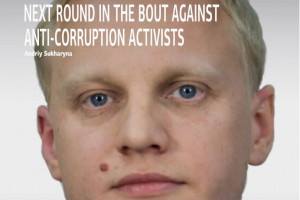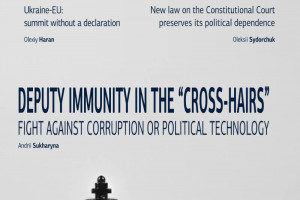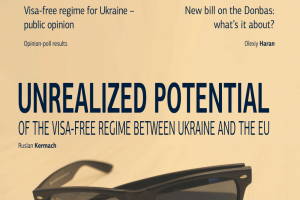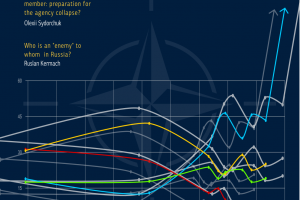JOE BIDEN IN UKRAINE: THE POLITICAL RATIONALE OF THE U.S. VICE PRESIDENT’S VISIT
І. Overviews of political events of the week
December |
U.S. Vice President Joe Biden paid an official visit to Kyiv. During his meeting with Ukrainian President Petro Poroshenko he called on Ukraine to fight corruption, which is an obstacle to the country’s development. In addition to that, Biden informed that the United States will provide Ukraine financial assistance in the “fight against corruption in the law enforcement sector and implementation of reform of the monetary system”. Biden also stressed the need for changes to the Constitution of Ukraine, adoption of the law on elections in the Donbas region and the execution of the Minsk agreements.
Premier of Ukraine Arseniy Yatsenyuk named five of the most important reforms that will be implemented in Ukraine during his meeting with U.S. Vice President Joe Biden. Specifically, they are deregulation and reduction of the influence of the authorities in power over economic processes, reform of Ukraine’s taxation system and the fiscal service, the fight against corruption of the customs service and privatization and introduction of new standards of management of state-run companies.
President Petro Poroshenko emphasized Ukraine’s readiness to support the actions of the coalition in Syria, underscoring that Ukrainian special forces prevented 200 acts of terrorism.
The Petro Poroshenko Bloc demands that Premier Arseniy Yatsenyuk give an explanation regarding the accusations of corruption against him declared by the head of the Odesa Oblast State Administration Mikhail Saakashvili. On December 6 during the Anti-corruption Forum in Odesa the head of the Odesa Oblast State Administration Mikhail Saakashvili criticized the work of the government and stated that due to corruption Ukraine is losing more than US $ 5 bn every year.
Initiators of the blockade of Crimea informed about the possible renewal of supply of electricity from the mainland of Ukraine to one of the electricity supply lines (ESL) to the peninsula.
The Election Commission in Kryviy Rih appealed to the Verkhovna Rada requesting it to announce new elections of the local head, deputy of the Samopomich united party Yehor Soboliev informed.
According to official data representative of the Opposition Bloc Yuriy Vilkul became the head of the local council in Kryviy Rih. The candidate that ran under the banner of Samopomich Yuriy Myloboh lost the election by 752 votes. His representatives say the votes were rigged in special voting stations and they filed a claim to the court.
Pro-Russian soldiers continue to fire on the positions of Ukrainian military forces in all directions, specifically Donetsk, Artemivsk, Luhansk and Mariupol, the press center of the ATO Headquarters informed.
December |
U.S. Vice President Joe Biden gave an address to deputies in the session hall of the Verkhovna Rada. He tried to convince the representatives of the political elite of Ukraine that they have a unique opportunity to build a successful country.
An agreement was reached in Minsk on the clearing of mines in five areas of the zone of conflict in the Donbas, Special Representative of the OSCE Chairperson-in-Office in Ukraine Martin Sijdik informed. He said the number of such areas will be increased to twelve by the New Year.
Ex-president of Ukraine Viktor Yanukovych announced his plans to return to politics. He said he is helping people that are being persecuted in Ukraine and that he maintains close ties with Ukrainian politicians. He stated this in an interview for the RIA Novosti information agency.
December |
Volodymyr Yelchenko, who since 2010 served as Ambassador of Ukraine to Russia, was appointed the new permanent representative of Ukraine in the United Nations Organization. He replaces Yuriy Sergeyev, who headed the permanent representative office of the UN since 2007. Minister of Foreign Affairs Pavlo Klimkin said Yelchenko knows the UN like the back of his hand and has respected authority in the organization.
The coalition will review the issue of responsibility of the government after adoption of the budget for next year. In the mean time, the Batkivshchyna faction informed that it fully supports the dismissal of Arseniy Yatsenyuk from the post of premier.
December |
The Verkhovna Rada approved the law on the civil service. The law envisages the forming of a committee that on transparent grounds in an online regime will select candidates for positions in the civil service. This law officially obligates government functionaries to speak Ukrainian.
The Security Service of Ukraine (SSU) informed about the detainment of a “diversionary-investigative group” in which three Russians and four Ukrainians operated. The suspected were detained in Kyiv and Kharkiv.
December |
During the address of Premier Arseniy Yatsenyuk in the session hall of the Verkhovna Rada a major brawl broke out between deputies of the Petro Poroshenko Bloc and the People’s Front. People’s deputy of the PPB Oleh Barna, who assaulted head of the government Arseniy Yatsenyuk during his report to parliament, provoked the fisticuffs. Leader of the PPB faction Yuriy Lutsenko assured that there will be serious talks with Barna.
Novovolynsk miners blockaded movement to the Yahodynska customs service on the border with Poland. Miners demanded payment of their hard earned money and a pay raise for their labor. As head of the Independent Miners’ Labor Union Mykhailo Volynets said, the miners cut off access to the customs border in two places.
JOE BIDEN IN UKRAINE: THE POLITICAL RATIONALE OF THE U.S. VICE PRESIDENT’S VISIT
One of the most sensational events of last week was the visit of U.S. Vice President Joe Biden to Ukraine. During his fourth official visit Biden held a number of important visits in Kyiv. First, Biden met with representatives of Ukrainian civil society among which are young MPs and prominent civil activists. After this he attended official meetings with President Petro Poroshenko and Prime Minister Arseniy Yatsenyuk during his two-day visit to Ukraine. In closing, the U.S. Vice President gave a resounding speech to the Ukrainian parliament that drew a standing ovation from the government and deputies.
The visit of the U.S. Vice President to Ukraine was clearly not by accident literally a few days prior to Prime Minister Yatsenyuk’s public report about his Cabinet’s year in office, which also coincided with the term of effect of the immunity regarding Cabinet of Ministers of Ukraine. On the backdrop of the continued rising social tension in the country and the people’s dissatisfaction with Premier Yatsenyuk, which also has quantitative expression in the current rating of Prime Minister that is close to the statistical margin of error, the prospect that MPs of the Verkhovna Rada give a vote of no-confidence in the current Cabinet of Ministers of Ukraine headed by Yatsenyuk seemed, if not mandatory, but at the very least more realistic than any time before.
In this context, the recent visit of U.S. Vice President Joe Biden can be assessed, among other things, as an attempt to support the current Ukrainian Prime Minister in a fateful time for him. Such support is most probably dictated not only by the fairly warm and friendly relations between Biden and Yatsenyuk, but also by the realistic strategic reasoning of Washington regarding the possible consequences of sudden changes in the political status quo in Ukraine.
Both the assessment of the current political and electoral situation in Ukraine and the understanding of the high political risks due to possible changes of the current political status quo, which will most likely become evident if the current government is dismissed, are grounds for such rationale of the American establishment. This means that there is a high probability that such a dismissal (as Prime Minister Arseniy Yatsenyuk hinted on more than one occasion) would entail the destructive for the current parliamentary majority abandoning of the coalition by the second largest pro-premier “People’s Front” faction in Verkhovna Rada.
The collapse of the coalition if the “People’s Front” pulls out of the coalition will inevitably actualize the issue of snap parliamentary elections the result of which is extremely difficult to prognosticate. Indeed, as the results of the recent campaign in the local elections in Ukraine show, political forces that are geared up to be in the opposition continue to gain greater strength compared to the pro-government political forces. Thus a prematurely elected parliament in Ukraine could turn out to be even more variegated and fragmented – and correspondingly even less predictable than the current parliament.
In light of this, the aspirations to prevent a considerably worse scenario of the country entering a new phase of unforeseen consequences of the electoral cycle and reformatting of the political power landscape could have had a much greater weight than the possible ‘fascination’ with the achievements of the current leadership of Ukraine on the grounds of Biden’s support of the current political configuration (i.e. status quo) in Ukraine.
Clearly, the low rated government of Yatsenyuk is totally not interested in the possibility of such a reformatting, while the president of Ukraine is most likely not ready for changes in the government at the cost of unforeseen snap election to the parliament. As such, in addition to the risks of a purely political nature outlined above, the rebooting of the Ukrainian parliament also implies a tangible delay in the possibility of adoption of important reform bills, in particular, the Tax Code and the National Budget for 2016 on which the prospect of being granted the necessary loans by the International Monetary Fund depends.
Putting high hopes on the current leadership of Ukraine, U.S. Vice President Joe Biden at the same time tried to give it some additional impetus in terms of reforms. In conditions of continued harsh criticism of the Ukrainian government for its sluggish pace in conducting reforms, the American leadership is basically supporting the social expectations of Ukrainians, which is critically important. The fact that Biden held his first meeting with representatives of civil society in Ukraine is a powerful symbolic step that points to the support of the efforts of the civil sector and the initiatives of the young wing of political activists in their constant pressure on the ruling power representatives and continued fostering of reform agenda at the highest political level.
The last address of the Vice President of the U.S. in the Ukrainian parliament, where among other things Biden underscored the position of Washington regarding the occupied territories in Crimea and the Donbas, was no less important. And though the statements of the U.S. Vice President were not sensational and in general repeated the position of the U.S. voiced many times earlier, their repeated articulation before the Ukrainian parliament gave this important and highly relevant for the official Kyiv position an additional weight. Specifically, Biden noted that the U.S. will never acknowledge the annexation of Crimea and emphasized the invariable position of Washington on the issue of sanctions imposed against Russia until all the requirements of the Minsk agreements are fulfilled. Such a position of the U.S. expressed by the second official of the State is incontrovertibly powerful and sends a positive signal of the international support of Ukraine. Such support of the world’s most powerful country that is capable of influencing international political agenda gives Ukraine a certain forecast of the future situation and creates sufficiently favorable preconditions for developing a more or less predictable long-term strategy regarding the uncontrolled territories in the Donbas and the territory of Crimea occupied by Russian Federation.
Conclusions
In closing, the latest visit of U.S. Vice President Joe Biden to Ukraine was most probably dictated first and foremost by the aspirations of Washington to support the current configuration of political powers in Ukraine and the government headed by Arseniy Yatsenyuk in light of the tangible rise in risks of political reformatting and accordingly Ukraine’s entry into a new phase of political turbulence and instability as a result of such reformatting. The aspirations of Washington to minimize the possibility of realization of a destructive and unforeseen scenario of snap elections to the Verkhovna Rada of Ukraine was also complemented by important accents on the need for intensifying reforms that garnered the support of civil society in Ukraine of its efforts in this direction. The principled and inflexible position of the U.S. expressed by Vice President Joe Biden regarding the non-recognition of the annexation of Crimea and the support of the continued sanctions against Russia until the full execution of Minsk process requirements in turn became the routine expression of the international support of Ukraine.
“Focus оn Ukraine” – weekly informational-analytical news bulletin prepared by the Ilko Kucheriv Democratic Initiatives Foundation (http://dif.org.ua).
DIF Analysts:
Iryna Bekeshkina
Oleksiy Haran
Ruslan Kermach
Oleksiy Sydorchuk
Maria Zolkina
Editor-in-chief: Iryna Filipchuk








